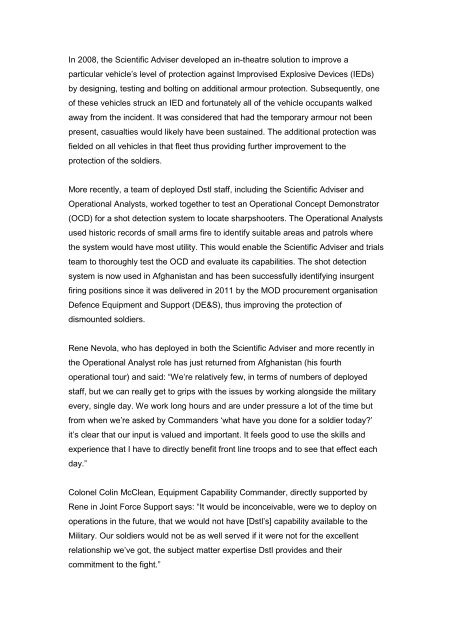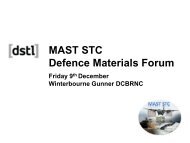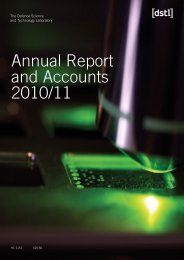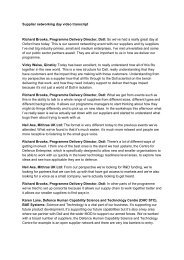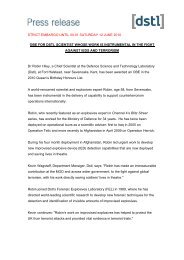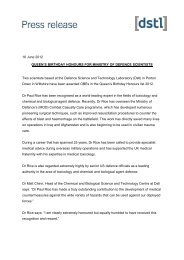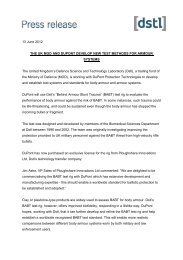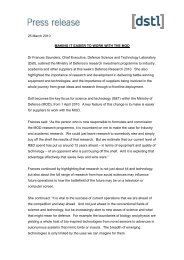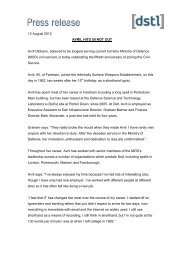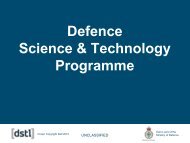Ten years of science support for frontline - Dstl
Ten years of science support for frontline - Dstl
Ten years of science support for frontline - Dstl
You also want an ePaper? Increase the reach of your titles
YUMPU automatically turns print PDFs into web optimized ePapers that Google loves.
In 2008, the Scientific Adviser developed an in-theatre solution to improve a<br />
particular vehicle’s level <strong>of</strong> protection against Improvised Explosive Devices (IEDs)<br />
by designing, testing and bolting on additional armour protection. Subsequently, one<br />
<strong>of</strong> these vehicles struck an IED and <strong>for</strong>tunately all <strong>of</strong> the vehicle occupants walked<br />
away from the incident. It was considered that had the temporary armour not been<br />
present, casualties would likely have been sustained. The additional protection was<br />
fielded on all vehicles in that fleet thus providing further improvement to the<br />
protection <strong>of</strong> the soldiers.<br />
More recently, a team <strong>of</strong> deployed <strong>Dstl</strong> staff, including the Scientific Adviser and<br />
Operational Analysts, worked together to test an Operational Concept Demonstrator<br />
(OCD) <strong>for</strong> a shot detection system to locate sharpshooters. The Operational Analysts<br />
used historic records <strong>of</strong> small arms fire to identify suitable areas and patrols where<br />
the system would have most utility. This would enable the Scientific Adviser and trials<br />
team to thoroughly test the OCD and evaluate its capabilities. The shot detection<br />
system is now used in Afghanistan and has been successfully identifying insurgent<br />
firing positions since it was delivered in 2011 by the MOD procurement organisation<br />
Defence Equipment and Support (DE&S), thus improving the protection <strong>of</strong><br />
dismounted soldiers.<br />
Rene Nevola, who has deployed in both the Scientific Adviser and more recently in<br />
the Operational Analyst role has just returned from Afghanistan (his fourth<br />
operational tour) and said: “We’re relatively few, in terms <strong>of</strong> numbers <strong>of</strong> deployed<br />
staff, but we can really get to grips with the issues by working alongside the military<br />
every, single day. We work long hours and are under pressure a lot <strong>of</strong> the time but<br />
from when we’re asked by Commanders ‘what have you done <strong>for</strong> a soldier today’<br />
it’s clear that our input is valued and important. It feels good to use the skills and<br />
experience that I have to directly benefit front line troops and to see that effect each<br />
day.”<br />
Colonel Colin McClean, Equipment Capability Commander, directly <strong>support</strong>ed by<br />
Rene in Joint Force Support says: “It would be inconceivable, were we to deploy on<br />
operations in the future, that we would not have [<strong>Dstl</strong>’s] capability available to the<br />
Military. Our soldiers would not be as well served if it were not <strong>for</strong> the excellent<br />
relationship we’ve got, the subject matter expertise <strong>Dstl</strong> provides and their<br />
commitment to the fight.”


